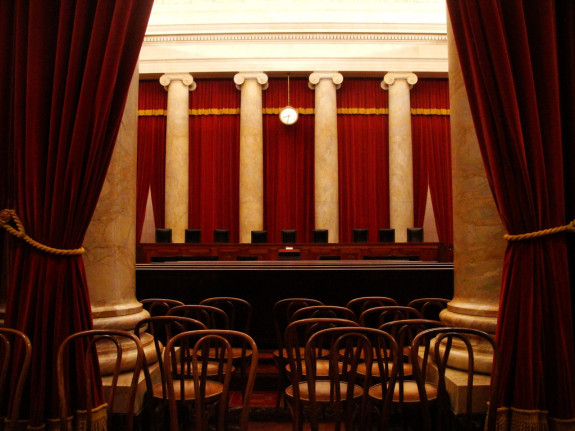
The U.S. Supreme Court might weigh in on the fight over redistricting documents. (Photo via Kenudigit/ CreativeCommons)
By Ashley Lopez
Florida Center for Investigative Reporting
A fight over documents from GOP consultants regarding congressional maps drawn by the Florida Legislature reached the U.S. Supreme Court this week.
Voting groups and state officials are into week two of a 12-day redistricting trial. A coalition of voters and activists are challenging the Florida Legislature’s newly-drawn congressional maps. The League and others are alleging that state lawmakers broke the law created by the Fair Districts Amendments, which says legislators cannot draw districts that favor incumbents or one political party over another.
As part of the legal challenge, the League of Women voters and others asked the Florida Supreme Court to overrule a lower court and require that political operatives turn over emails, maps and memos related to the state’s redistricting effort in 2012.
On Tuesday, the Florida Supreme Court in 5-2 vote ruled that GOP consultants release documents pertaining to the state’s 2012 redistricting effort, but the records would only be discussed when the courtroom is sealed off from the public and the media.
According to The Orlando Sentinel:
The court ruled that records and emails of Pat Bainter and Gainesville-based Data Targeting – which was paid $6.2 million over the last three years by the Republican Party of Florida – are relevant to the trial. But “any disclosure or use of the documents must take place under seal in a courtroom closed to the public,” its 5-2 decision said.
The order sides with Leon County Circuit Judge Terry Lewis, who is hearing the case against the Legislature brought by the League of Women Voters and other groups, and reverses a decision an appeals court made last week to block the records from being used in the case.
Lawyers for the plaintiffs have argued the records [are] a critical part of their case to show that Republican lawmakers, political consultants and others colluded to draw maps that violated the 2010 constitutional reform banning intentional gerrymandering.
Bainter and other GOP operatives that work for his company have argued the demands to produce their own internal maps, emails and other documents violate their First Amendment rights.
The decision to block the public and media may complicate the case, if media organizations opt to sue to gain access to the court.
On Thursday, members of the media were asked to leave the courtroom as Bainter took the stand to discuss the 538 pages of the consultant’s documents.
According to WFSU, “reporters in the courtroom at the time of the closure told the judge they disagreed with the secrecy.”
[Associated Press reporter Gary Fineout] and reporters from three major Florida newspapers stood and told Judge Terry Lewis they objected to being thrown out, Fineout says, because, “I think it is generally the position of media organizations that a trial of this magnitude should not be conducted behind closed doors, that all the proceedings should be open and available for the public.”
Lewis told the reporters, “Duly noted,” before having the doors locked. The trial is expected to continue—with the public allowed—Friday morning.
Also this week, those same political consultants involved the U.S. Supreme Court—specifically Clarence Thomas, who handles emergency applications from Florida.
According to the Associated Press:
An emergency petition was filed Wednesday with U.S. Supreme Court Justice Clarence Thomas that asked him to stop a Florida judge from hearing evidence obtained from a Republican political consulting firm.
…”An emergency stay is necessary to prevent disclosure of this privileged information (and its entry into evidence) during the ongoing trial in the underlying case, to keep the proverbial cat in the bag, and to preserve the Applicants’ ability to later petition this court,” states the petition written by Tallahassee attorney D. Kent Safriet.
Data Targeting’s lawyers, who are being paid by the Republican Party of Florida, maintain that disclosing the information would violate First Amendment speech rights as well as reveal trade secrets. The court filing also argues the information is irrelevant to determining whether the Legislature violated new standards adopted by voters in 2010.
The legislature’s lawyers are expected to begin their defense on Friday.
